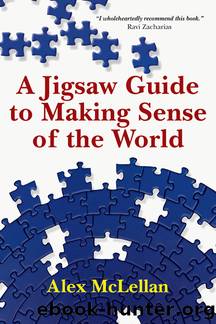A Jigsaw Guide to Making Sense of the World by McLellan Alex;

Author:McLellan, Alex; [McLellan, Alex]
Language: eng
Format: epub
ISBN: 9780830866588
Publisher: InterVarsity Press
Published: 2012-10-01T00:00:00+00:00
Craig has said that âreasonâs role is that of a servant. Reason is a God-given instrument to help us better understand and defend our faith.â[22] We cannot even begin to conduct scientific inquiry without having faith in the scientific methodâscience has to assume there is regularity in nature and that the external world is real. The scientific method helps us interact with the world in a wonderful way, but scientists have to assume that certain things are true by faith. On this basis Atkins and Dawkins are, like the rest of us, people of faith, and it is important to keep them humble by reminding them. Be prepared to scratch the surface of an atheistâs belief, but bewareâmany atheists do not like being scratched.
As if this were not humbling enough for Dawkins and company, there is another crucial fact to expose when it comes to atheism (either old or new)âthe blind belief that rational human beings have emerged from a nonrational world. In chapter one we considered how philosopher John Gray, a self-described religious skeptic (a title that seems to grant him some degree of critical immunity), has powerfully unmasked the more outspoken atheist by stating that âhumans cannot be other than irrational. Curiously, this is a conclusion few rationalists have been ready to accept.â[23]
If itâs true that as Bertrand Russell states we are ultimately the accidental outcome of a collocation of atoms, the rationality of atheism will implode under cross-examination. C. S. Lewis said, âA strict materialism refutes itself for the reasons given long ago by Professor Haldane: âIf my mental processes are determined wholly by the motions of atoms in my brain, I have no reason to suppose that my beliefs are true . . . and hence I have no reason for supposing my brain to be composed of atoms.ââ[24] Unfortunately, this means there is no scientific basis for believing that human beings are rationally equipped to do science, and when âpeople of scienceâ try to distance themselves from âpeople of faith,â we need to be ready to bring them back down to earthâoften with a bump. As John Polkinghorne has said, âThe scientist and the theologian both work by faith, a realist trust in the rational reliability of our understanding of experience.â[25]
Faith and Feeling
When faith comes under attack it often seeks refuge in the realm of feeling, and when it goes in this direction many people are quick to follow. There is something comforting about keeping things close to your chestâand close to your heartâand weâve already described this temptation in the context of truth and belief. If my faith is anchored in feelings then it is protected since you cannot criticize it, and when it is based on my feelings it should be respected since everyone can have their own faith their own way.
Some religions encourage this kind of unquestioning approach to faith. Many Eastern worldviews begin with the directive to stop thinking and empty your mind: âWhen your mind is without anything and you are no-minds, then you are free and spiritual, empty and marvelous.
Download
This site does not store any files on its server. We only index and link to content provided by other sites. Please contact the content providers to delete copyright contents if any and email us, we'll remove relevant links or contents immediately.
Fangirl by Rainbow Rowell(8808)
How to Bang a Billionaire by Alexis Hall(7942)
Wonder by R. J. Palacio(7750)
The Space Between by Michelle L. Teichman(6589)
The Thirst by Nesbo Jo(6458)
Assassin’s Fate by Robin Hobb(5867)
Wiseguy by Nicholas Pileggi(5336)
The Night Circus by Erin Morgenstern(5044)
The Kite Runner by Khaled Hosseini(4963)
Paper Towns by Green John(4815)
Bittersweet (True North #1) by Sarina Bowen(4720)
Gerald's Game by Stephen King(4386)
Too Much and Not the Mood by Durga Chew-Bose(4105)
Pillow Thoughts by Courtney Peppernell(4039)
Goodbye Paradise(3464)
Twelve Days of Christmas by Debbie Macomber(3421)
Good by S. Walden(3361)
The Rosie Effect by Graeme Simsion(3223)
The Cellar by Natasha Preston(3081)
